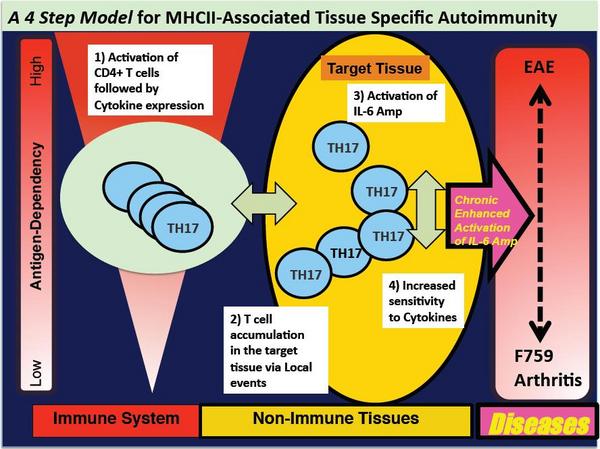News & Topics
Local microbleeding facilitates IL-6- and IL-17-dependent arthritis in the absence of tissue antigen recognition by activated T cells. (Associate Prof. Murakami & Prof. Hirano in JEM)
The recognition of specific antigens by CD4+ T cells is thought to play important roles in the development of autoimmune diseases, particularly when the diseases are associated with class II MHC alleles. In many cases, however, the antigens that activate CD4+ T cells and directly induce the disease have not been identified, despite therapeutic strategies that target T cells attenuate disease symptoms.
Here we show that the development of class II MHC-associated autoimmune arthritis in F759 mice critically depends on the expression of IL-17A in CD4+ T cells, whereas specific antigen recognition by this T cell population does not appear to play a significant etiologic role.
Our results demonstrate that the TCRVα and TCRVβ profiles of CD4+ T cells in F759 mice with autoimmune arthritis are significantly perturbed. On the other hand, transgenic expression of a single version of the T cell receptor in RAG2-deficient F759 mice resulted in autoimmune arthritis accompanied by splenomegaly, lymphadenopathy, and increased Th17 cell numbers. Additionally, joint injections of Th17 cells, but not activated, nonpolarized CD4+ T cells precipitated arthritis by amplifying IL-6 signaling in type 1 collagen+ fibroblasts. Because forced expression of IL-17A in RAG2-deficient F759 mice induced the disease, these data demonstrate that IL-17A expression in CD4+ T cells rather than TCR recognition of specific antigens mediates the development of a class II MHC-associated autoimmune disease. Thus, some tissue-specific autoimmune disorders that are associated with class II MHC molecules may be caused by enhanced sensitivity to CD4+ T cell-derived cytokines in the affected tissues but not by antigen-recognitions of CD4+ T cells. These results may provide a foundation for new therapies for autoimmune diseases that are associated with class II MHC alleles but have not yet been linked to specific T cell antigens.

Article
Contact:
Masaaki Murakamimurakami@molonc.med.osaka-u.ac.jp
Toshio Hirano
hirano@molonc.med.osaka-u.ac.jp
Laboratory of Developmental Immunology
Immunology Frontier Research Center (IFReC), Osaka University
